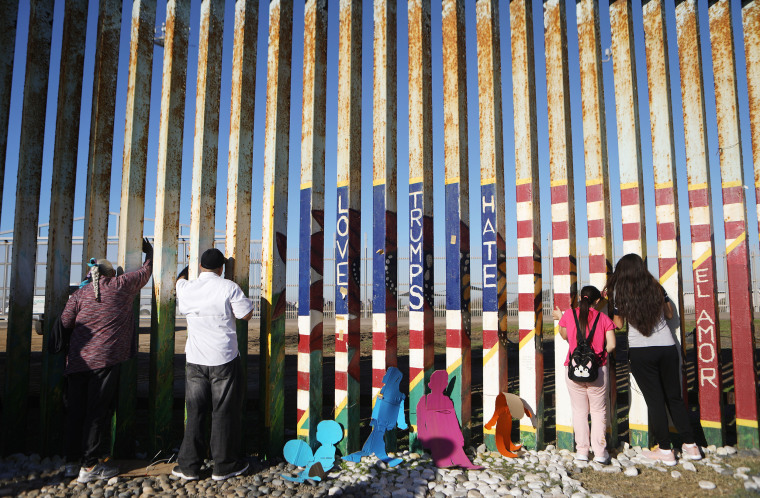WASHINGTON — Days before a Friday night deadline to fund the government and prevent a partial shutdown, the workweek began Monday with no plan to resolve the impasse.
No further conversations occurred over the weekend between Democratic leaders and the White House, aides said.
“They have not responded to our offers,” said an aide to House Minority Leader Nancy Pelosi of California, who’s poised to be formally elected speaker in January.
Soon after, President Donald Trump broke a weekend of social media silence on wall funding, publicly slamming the Democrats' position. "Anytime you hear a Democrat saying that you can have good Border Security without a Wall, write them off as just another politician following the party line," he tweeted Monday.
During an Oval Office meeting last Tuesday, Pelosi and Senate Minority Leader Chuck Schumer of New York gave the president two options to keep the government open: Either Congress passes six remaining appropriations bills and a one-year spending bill for the Department of Homeland Security that maintains current funding levels, or it passes a one-year spending bill extending current levels for half of the government.
The White House, however, hasn’t entertained either idea — and Democrats have made clear they don’t plan to budge. Top White House adviser Stephen Miller doubled down Sunday on Trump’s threat to shut down the government in order to secure his requested $5 billion in funding for a wall along the U.S.-Mexico border.
“We're going to do whatever is necessary to build the border wall to stop this ongoing crisis of illegal immigration,” Miller said in an interview on CBS’s “Face the Nation.” And asked if that means a shutdown, he replied, “If it comes to it, absolutely.”
Trump, who is set to leave Washington at the end of the week for a 16-day vacation at Mar-a-Lago in Florida, has signaled multiple times that he’s prepared to shut down the government.
“If we don't get what we want one way or the other ... I will shut down the government," Trump said during the meeting last week with Pelosi and Schumer. "I am proud to shut down the government for border security. ... I will take the mantle of shutting it down.”
Democratic leaders have told Trump that the GOP-controlled Congress doesn’t have the votes to pass $5 billion in funding for a wall. In the Senate, Republicans have to rely on Democratic votes because 60 votes are needed to advance appropriations bills. There are currently 51 Republican, 47 Democrats and two independent senators who caucus with Democrats.
“President Trump should understand there are not the votes for the wall in the House or the Senate. He is not going to get the wall in any form,” Schumer said in an interview on NBC’s “Meet the Press” on Sunday.
Over on the House side, GOP leaders have had no concrete plan on how to proceed because of absent members. Since the midterm elections last month, a number of lawmakers — many of whom are retiring from Congress or who've lost their elections — have been missing from votes.
Their absence means House Republicans would likely have to rely on Democratic votes in the House in order to proceed with a spending measure — which means they wouldn't be able to deliver the wall funding Trump is demanding.
Asked last week if Trump’s message of being proud to shut down the government screws House GOP messaging, House Majority Deputy Whip Patrick McHenry of North Carolina said, “A bit.”
And even as the clock ticks down to Friday’s deadline, GOP leaders decided last week to cancel the scheduled House sessions for Monday and Tuesday. House lawmakers aren’t scheduled to return to Capitol Hill until Wednesday evening.
It’s unclear if Congress will even attempt to pass legislation that excludes border wall funding before the deadline since Trump’s comments have suggested he would veto it regardless, triggering a shutdown.
If a shutdown were to occur Saturday, and it carried into January, Trump faces even lower odds of getting what he wants. Pelosi said last week that the new Democratic House majority would pass legislation seeking to end a shutdown.
“I told the president that the new House of Representatives, when it convenes, will pass what Mr. Schumer suggested here, the distinguished Senate leader suggested, in terms of passing the six bills: the six appropriation bills that are agreed to in a bipartisan way and have a continuing resolution until Sept. 30 for the Homeland Security bill, during which time we can discuss these issues further,” Pelosi told reporters after the White House meeting.
If a shutdown does happen, it would be the third one this year. The longest one in recent years was in 2013 when the entire government was shut down for 16 days over Republican efforts to defund the Affordable Care Act. According to a recent Congressional Research Service report, that shutdown resulted in the furlough of roughly 850,000 employees per day.
This time around, there would only be a partial shutdown, because Congress has already provided funding to part of the government. According to the staff of Sen. Patrick Leahy, D-Vt., ranking member on the Senate Appropriations Committee, a partial shutdown would result in more than 420,000 federal employees working without pay and more than 380,000 would be furloughed.

